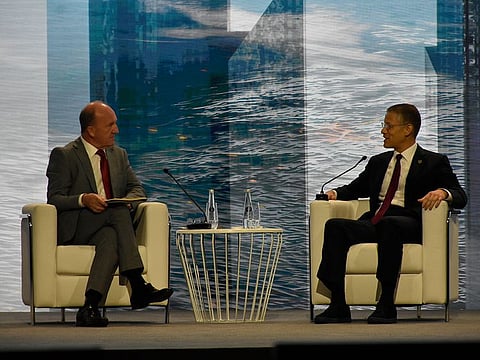Climate action takes centre stage at the Dubai Business Forum
The event welcomed hundreds of global changemakers and industry experts

Hosted under the patronage of His Highness Shaikh Mohammad bin Rashid Al Maktoum, Vice President and Prime Minister of the UAE and Ruler of Dubai, the Dubai Business Forum convened international business leaders and key economic figures for a two-day event that represents a key moment in the region’s annual business calendar to discuss the trends and solutions shaping deal-making today.
The event welcomed hundreds of global changemakers and industry experts for an array of engaging high-level plenaries and sessions with a focus on ‘getting business done’ by driving crucial conversations and facilitating pivotal partnerships to transform the future of business.
Keynote speakers included Abdullah Bin Touq Al Marri, Minister of Economy; Abdul-Aziz Abdulla Al Ghurair, Chairman, Dubai Chambers; Helal Saeed Al Marri, Director General, Dubai Department of Economy and Tourism; Saeed Al Tayer; MD & CEO, Dubai Electricity & Water Authority; Khalfan Belhoul, CEO, Dubai Future Foundation; Badr Jafar, COP28 Special Representative for Business and Philanthropy.
This year’s Forum also addressed the critical topic of topic of climate action and the role that businesses and the broader private sector has to play in meeting climate and nature goals ahead of the United Nations Climate Change Conference hosted by the UAE, COP28.
With COP28 only a few weeks away, Jafar said, “In a first for COP, the COP28 Presidency will be hosting the COP28 Business & Climate Forum to galvanise the ingenuity and capacity of the private sector. Dr Sultan Al Jaber has called for a new paradigm of ‘actionism’, which embraces the dynamism, capital, and action networks that business and philanthropy must bring to the table if we are to move from pledges and announcements to action and implementation.”
Badr Jafar, a staunch advocate of strategic philanthropy and Founding Patron of the Centre for Strategic Philanthropy at the University of Cambridge, and the NYU-Abu Dhabi Strategic Philanthropy Initiative, went on to explain how philanthropy can be the glue that binds business, government, and civil society together in concerted, consistent action – that has been lacking so far, and that has stymied progress on the climate agenda.
“Strategic climate and nature philanthropy has the ability to deploy flexible, risk-tolerant, and patient capital in ways that uniquely leverage business and government capital and create that multiplier effect we need if we are to move from billions to trillions towards climate solutions,” Jafar explained.
Addressing the energy transition, a central pillar of the COP28 Action Agenda, Jafar added, "If the first UN Sustainable Development Goal is to eradicate extreme poverty by 2030, we must look at both energy and society’s challenges through a single lens. By thinking about society and energy as two sides of the same coin, countries can fully evaluate smart energy policies as enablers of development, especially in the regions like MENA where supporting a fair and just energy evolution must also facilitate economic growth and resultant critical jobs.”
The COP28 Business and Philanthropy Climate Forum will be hosted by the COP28 Presidency on the 1st and 2nd of December, and attendees will look at calculated solutions for accelerating tech transfer, de-risking green investments, enhancing nature capital, boosting green SMEs and start-ups, and investing in mitigation and adaptation tactics to support the most vulnerable.
Sign up for the Daily Briefing
Get the latest news and updates straight to your inbox



